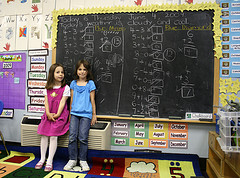Want to know what really burns me up? Telling a kid he’s not good at math. Know what’s just as bad? Telling a mom that her kid isn’t good at math.
This morning, I was early for my fitness boot camp class. (Sadly, I don’t get to work with Robert the personal trainer.) I chatted with a couple of the women who, like me, show up every morning at 6:45 for an hour of torture. Of course, I had to share that I got advance copies of my book, Math for Grownups, yesterday. Per usual, the conversation turned to the absolutely ridiculous and completely frustrating notion that people are either good at math and science or they’re good at language arts.
Now, for the record, I wholeheartedly disagree with that line of thinking. (Can you tell?) Keep reading to find out why.
One mom said that her son’s first grade class was good at reading but not math. How did she know this? The teacher told her. There are so many unbelievably wrong things about this situation, and thinking about it makes me want to scream:
- They’re first graders! How can six year olds be bad at math? They might be missing some basic concepts, like counting up to add or the difference between a triangle and a square. But remember, nobody is born bad at math.
- It’s the teacher’s job to make sure kids understand basic math concepts. Blaming the students is a cop out.
- Telling parents that an entire group of kids is bad at math is a self-fulfilling prophecy. Already, parents (and other grownups) believe that math ability is like being tall or having blue eyes–you either have it or you don’t. This teacher may have unwittingly reinforced this idea, by making such a silly generalization.
- If she told the parents this, what message is she sending the kids? If you’ve been a parent, you know that there are a trillion different messages that we send to our kids every day, without even knowing it. I would bet my last dollar that this teacher is somehow relaying to her students that math is just not their thing.
First graders who think they’re not good at math, grow up to be middle schoolers who think algebra is beyond them. These middle schoolers of course awkwardly morph into teenagers who are convinced that they won’t need (and can’t do) geometry, trig, advanced algebra, probability, statistics and calculus. And then of course, these acne-prone, love-sick adolescents become the smart, successful adults who tell me every day that they desperately need my book, because they can’t balance their checkbooks to save their souls.
But really, I’m not blaming this one teacher. I promise. She’s just the beginning of a long line of teachers and other grownups who buy the lies about math: that only people with “math brains” can comprehend the Pythagorean Theorem and no one uses math in everyday life anyway.
So, what’s the solution? The issue is not the students. The issue is that we somehow believe that there is only one way to teach math. Of course that’s not true. Teachers and parents have to figure out how our kids think and approach math in a way that makes sense to them. And we have to quit labeling ourselves and our kids.
All you parents out there, I’d be forever grateful if you’d do just one of these things:
- If a teacher says your kid is bad at math–or worse, declares an entire class bad at math–please challenge him or her. There are only a few people in the world who have real issues with processing mathematical information, and I’m betting your kid isn’t one of them.
- Stop telling people that you, yourself, are bad at math. Next time your dinner companion asks, “Can you help me figure out the tip?” bite your tongue. If you truly can’t find 15% of $24.68, pretend you didn’t hear or fake it. But please avoid saying the all-too-common, “I’m so bad at math!”
- If you can’t help your kid with his homework, don’t declare: “I just don’t have the math gene!” Here’s the reality: You may not remember how solve a proportion, but that’s because you probably haven’t seen one for at least 15 years. If you were asked to diagram a sentence and couldn’t do it, would you say that you’re no good at speaking English? Of course not.
- Replace your generalizations about math ability with messages like these: “I don’t remember how to do that. Let’s figure it out.” or “I remember doing these kinds of problems in school, and they gave me trouble. But I’m sure we can figure it out together.”
And just a quick footnote/disclaimer: I am the biggest advocate of schools and teachers that you will ever meet. Having been a public school teacher and been raised in a family of teachers, I’ve seen first-hand what our educators face on a daily basis. I just wish I didn’t hear stories like the one I heard this morning.
I’m going to gingerly climb off of my soapbox now. (My glutes are killing me after that workout!) But I ask you to share your thoughts on these generalizations about math ability and math education. What messages have you or your kids received? What do you think about them? How do you think we can counter them? And for all you teachers out there: how do you send the message to your students that they are good at math?
I’ve decided to start a regular feature about math education, called Summer School. In it, I’ll discuss some ways that parents can send the right messages about math. We don’t need another generation of grownups who think they can’t do math! 🙂
